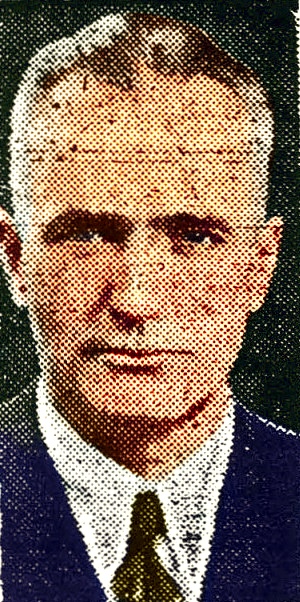Sherwood: ‘Doughnut Girls’ cheer fighters
By Lydia Sherwood, North American Newspaper Alliance
Lydia Sherwood, daughter of Mr. and Mrs. Arthur Murray Sherwood of New York City and niece of Robert E. Sherwood, noted playwright and overseas director of operations of the Office of War Information, is currently serving with a Red Cross clubmobile behind the frontlines in Italy. In the following story, she relates some of her experiences and tells of the reaction of our fighting men, on seeing real American girls so near the firing lines.
Fifth Army front in Italy – (by radio)
“Hey! Where’s the doughnuts?”
That cry has been ringing in my ears for almost a year. It has followed me through Africa and Sicily and for the last two months I have been hearing it in Italy.
As our three-quarter-ton truck with its red and white “American Red Cross” markings speeds (or wallows) over the muddy Italian roads, the shout goes up – from the crew of a Long Tom hidden under its camouflage net beside the road; or from a handful of combat engineers standing knee-deep in icy, muddy water, rebuilding a bridge; or from a mud-drabbed bunch of Texas and Oklahoma muleskinners packing rations and ammunitions up the mountains.
If we have any doughnuts left from our last assignment, we stop, and the boys come scrambling out of the gun pit or whatever it happens to be, and tack back doughnuts in their helmets for friends who can’t leave their posts. We were goodbye and off we go again.
Officially I and my teammates – Mary Ann Landis of Mechanicsburg, Pennsylvania; Betty Jones of Oklahoma City and Connie Briggs of Houston, Texas – are known as American Red Cross staff assistants, clubmobile. But to the thousands of G.I.s to whom we serve coffee and doughnuts, all clubmobile girls are known simply as “Doughnut Girls.” The sight of us and our Red Cross truck means doughnuts; and conversely the presence of a doughnut usually means that we’re somewhere around, too.
Added together, we and the doughnuts and the truck and the Victrola that we carry with American records when we can get them, means a link with home to the boys in the remote outposts that we cover.
Some of them are pretty remote, too, from civilization at least, for they’re not always so remote from the Germans. We’ve ladled coffee and handed out doughnuts within about a thousand yards of the German lines; and our base of operations, the village where we lived and had our doughnut machine set up, was within artillery range when we first move in.
In dive-bombing attacks
Naturally, the section of the infantry division we serve won’t let us go right up to the frontline; and even if we could get there, we’d just be in the way. They also steer us away from areas where there’s a lot of “incoming mail” (enemy shelling). But even in supposedly quiet areas, there’s no way of telling when it may start up again and we have seen a few 88 shells land uncomfortably close.
We’ve also been in two or three enemy dive-bombing attacks, though Jerry’s aim didn’t seem to be good enough to cause much alarm. Far more alarming was our own ack-ack going up all around.
In Africa and Sicily, from March to the end of October, I was in clubmobile work with the Air Forces.
In the Italian campaign, we clubmobile gals are classified as “expendable” – which we weren’t in Africa. We like it better this way because we feel that our work is more valuable the nearer we get to the frontlines.
To the boys in the rear, who have good food and a dry place to sleep, coffee and doughnuts and American girls are a pleasant break in the Army routine; but to the boys who’ve been living in mud and snow on the mountaintops, eating “K” rations and undergoing the mortar and shellfire, our coming is really an event.
Their first reaction on seeing us is complete astonishment; then come the inevitable questions: “Are you really an American girl?” “You mean you speak English?” “Where are you from in the States?” “How long have you been overseas?” and so forth.
Men quieter at front
The closer we get to the front, the quieter the men are as a group. Most of them are physically dead tired from a week or maybe two or three weeks in the lines; many of them have seen their friends killed or wounded. After the coffee and doughnuts have been served, they like to stand around quietly and talk and to show us snapshots of their families at home.
Often, we get requests to write to a soldier’s family and say that we’ve seen him. What most of the boys say:
Just write and tell my Ma you’ve seen me and that I’m okay. She doesn’t believe me when I write. She thinks I’m just trying to make her feel good.
More than anything else, they like listening to the Victrola; they crowd around it playing record after record. It’s heartbreaking when you have to say:
Sorry – as soon as this record is finished, we’ve got to take off.
Sometimes the outfits we serve are so far forward that they have no regular mess tent or kitchen facilities, so that we have to resort to some strange expedients to make our coffee. At one tank destroyer outfit, I made coffee in a can that had last been used to boil clothes over a bonfire whose fuel was the cardboard casings from 105mm shells.
Another time an inspired Special Services officer loaded an entire G.I. unit stove onto an open three-quarter-ton truck with two G.I. cooks as crew and we made the coffee en route from one outfit to another. The officer led the way in his jeep, we followed in the Red Cross truck and the coffee truck brought up the rear, so we made quite a convoy as we steamed up the mountains. Usually, we make up a batch of coffee in the mess tent of our forward CP and carry it the rest of the way in five-gallon G.I. water casks.
Often we feel that what we do – dishing out coffee, handing out a few doughnuts, cranking a Victrola and just talking – isn’t much to do for the boys who are living in holes, sweating out mortar fire, suffering from cold, rain, snow and mud, enduring every kind of discomfort and privation every hour of the day and night. But it’s the best we can do and perhaps the best anybody can do for men situated as they are.




